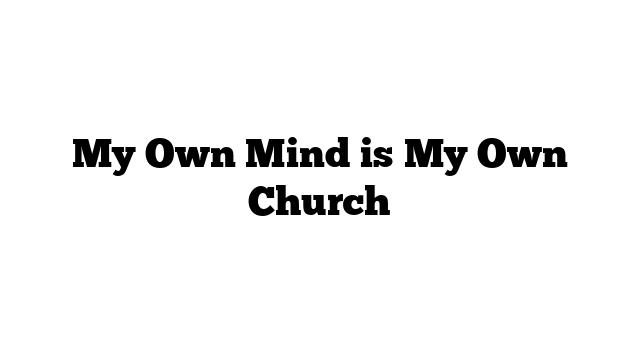Miscellaneous
My Own Mind is My Own Church
Introduction
In today’s interconnected world, where religious institutions hold significant influence over people’s lives, there are those who find solace in the power of their own thoughts and beliefs. Thomas Paine, a renowned Founding Father and philosopher, famously said, “My own mind is my own church.” This profound statement reflects the idea that one’s personal beliefs and the ability to think critically can serve as a source of guidance and fulfillment. In this article, we will explore the concept of “my own mind is my own church” and how it relates to individual spirituality, personal growth, and the pursuit of truth.
The Power of Personal Beliefs
There is an inherent human desire to seek meaning and purpose. For centuries, people have turned to organized religion to find answers to life’s big questions. However, there is another path, one that involves looking inward and finding solace and guidance within oneself. “My own mind is my own church” encapsulates the notion that personal beliefs, shaped by critical thinking and introspection, can serve as a moral compass in navigating the complexities of life.
Thomas Paine and the Individual’s Relationship with Religion
Thomas Paine, a prominent figure in the American Revolution, was also a philosopher known for his influential pamphlet, “Common Sense.” In his later work, “The Age of Reason,” Paine criticized the institutionalized nature of religion and advocated for individual reasoning and personal beliefs. He rejected dogma and argued that each person should construct their own spiritual beliefs based on reason and personal experience. Paine’s stance encapsulates the idea that religion should be a personal journey, not one dictated by external institutions.
The Pitfalls of Religious Institutions
Religious institutions, while providing a sense of community and shared beliefs, can also be sources of division, dogma, and oppression. Throughout history, we have seen religious institutions wield power for political gain, discriminate against certain groups, and stifle intellectual freedom. By declaring “my own mind is my own church,” individuals reclaim their right to think critically, challenge orthodoxy, and pursue their own spiritual path free from external influences.
The Role of Critical Thinking
Critical thinking plays a vital role in shaping our personal beliefs. By questioning the world around us and examining different perspectives, we engage in a process that allows us to critically evaluate our own thoughts. When we rely solely on external religious structures and doctrines, we risk accepting beliefs without discernment. In contrast, “my own mind is my own church” emphasizes the importance of independent thought and reasoning.
Personal Growth and Exploration
Declaring “my own mind is my own church” opens up avenues for personal growth and exploration. It encourages individuals to seek knowledge from various sources, drawing wisdom from philosophy, science, and other spiritual traditions. By actively engaging with different ideas and perspectives, we expand our understanding of the world and develop a more holistic and nuanced view of spirituality.
The Pursuit of Truth and Meaning
The pursuit of truth and meaning lies at the heart of the human experience. While religious institutions offer frameworks for understanding the world, individuals can also find deep meaning and purpose by exploring their own beliefs. “My own mind is my own church” highlights the importance of personal introspection and introspection in the search for truth and existential fulfillment.
Conclusion
“My own mind is my own church” encapsulates the notion that personal beliefs, shaped by critical thinking and introspection, can serve as a moral compass. Declaring this phrase signifies a commitment to independent thought and the rejection of blind following. While religious institutions provide community and structure for many, individuals have the power to chart their own spiritual path and seek truth and meaning within themselves. By embracing the idea that our own minds can serve as a church, we open ourselves up to personal growth, spiritual exploration, and a deeper understanding of ourselves and the world around us.

